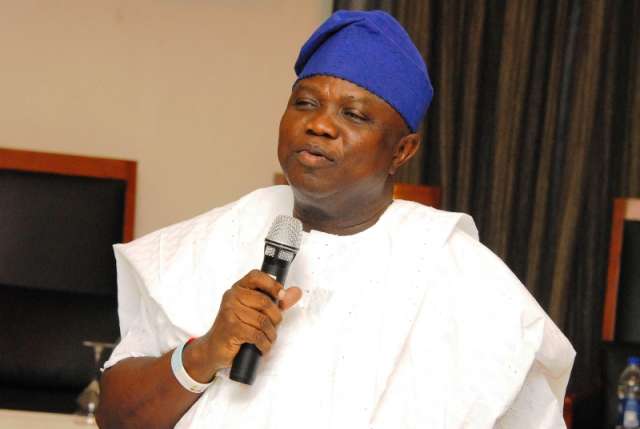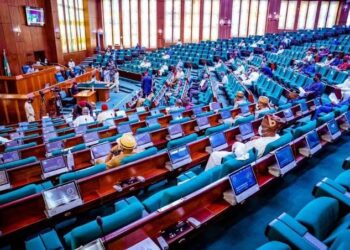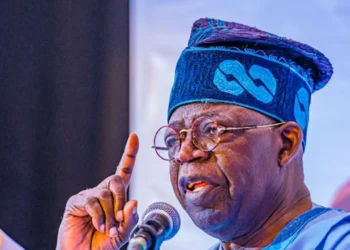 Locking up more than 209 children in Lagos State prisons for sundry offences such as hawking and crossing the highways has, no doubt, violated their rights as encapsulated by the 54-point Article of the UN Convention on the Rights of the Child.
Locking up more than 209 children in Lagos State prisons for sundry offences such as hawking and crossing the highways has, no doubt, violated their rights as encapsulated by the 54-point Article of the UN Convention on the Rights of the Child.
Adopted and opened for signature, ratification and accession by the General Assembly resolution 44/25 of 20 November 1989, it came into effect on Sept. 2, 1990.
It was domesticated in the country by the Nigerian Child Rights Act 2003 and reinforced by the Millennium Development Goals (MDGs) 2015.
To achieve the eight goals, UNICEF has called attention to the fact that meeting the MDGs requires paying attention to the rights of children and their protection.
According to the Act and the UN Convention, a child is a person who has not attained the age of 18 years.
The law guarantees respect for the dignity of the child and stipulates that children shall not be subjected to physical, mental or emotional injury, abuse, neglect, sexual abuse, torture, inhuman, degrading treatment, punishment or attack.
Rather than respect and defend the children, their rights are being infringed upon with impunity.
In Lagos State, such breaches of their rights have attracted the attention of the high and the mighty in the temple of justice (the judicial arm of government) which had ordered their incarceration through the mobile courts.
But for the instrumentality of the apex authority in the state’s judiciary, the children may have been left to rot in jail.
Incensed by the lock up of underage girls and boys in adult prisons with hardened criminals for minor offences, the State Chief Judge, Justice Olufunmilayo Atilade, on Aug. 14, 2017, flung open the prison gates across the state for 209 juvenile offenders out of the scores of disease-ravaged minors trapped in the cells.
Their release was greeted with mixed feelings; tears and joy rented the air as the people let loose their pent-up emotions.
What she saw in the prisons enveloped by foul air and smell smacks of pity and indignation.
Atilade’s intervention was prompted by a “Save-Our-Souls’’ from Mrs Modupe Olubanwo, the Head of the Legal Team of the Fountain of Life Church, Lagos.
Olubanwo noted that of the 81 juvenile offenders’ names submitted to the High Court for screening for release, 49 were certified for release from custody.
According to prison sources, some of the children had died before the visitation as a result of worsening sanitary condition, poor welfare, lack of potable water and overcrowding in the prisons.
A breakdown shows 62 in Kirikiri Female and Medium Prisons in Lagos and 80 in Badagry Prison. Added to this are 67 inmates living with disabilities incarcerated at Kirikiri Prisons.
Disappointingly, the juveniles were not imprisoned for serious crimes but for sundry offences such as hawking and breach of peace.
The juvenile inmates, who are below 18 years, were arrested and prosecuted by the Lagos State Task Force on Environmental and Miscellaneous Offences in different parts of the metropolis.
They are serving various prison terms for their inability to pay the fines from N2, 000 and above imposed on them by the mobile courts operating across the metropolis.
An upset chief judge said on her visit to Kirikiri facility on Aug. 14 that her intervention particularly at the Female Prisons was part of efforts to address the problem of underage offenders being locked up in prisons in the state.
By the judicial fiat of Atilade, 13 underage girls were set free from the female prison, while 49 underage boys also breathed air of freedom from the Medium Prison to depopulate the facilities.
Statistics made available to NAN indicate that the Kirikiri Medium Prisons which has capacity for only 1, 700 inmates, currently accommodates 3,816 inmates, of which 3,093 are awaiting trial, while 723 have been convicted.
“We are here to address the issue of underage offenders in our prisons; we need to look into the problem.
“I am here with my delegation comprising judges of the High Court, officials of the Ministry of Justice, Office of the Public Defender (OPD) and Directorate of Public Prosecutions (DPP) as well as other stakeholders,’’ Atilade said while signing their release warrants in line with Section 1(1) of the Criminal Justice Release from Custody Special Provisions Act, Laws of the Federation 2007.
While releasing the 67 inmates with physical disabilities, the chief judge said their release was on health grounds.
“I have taken cognisance of the fact that 67 people living with disabilities are in the prison, I hereby release them on health grounds.
“Those that have been convicted of their crimes will be handed over to the Ministry of Youths and Social Welfare for their empowerment and rehabilitation.’’
Equally piqued by the criminalising of the underage as a mother, Justice Yetunde Idowu, who was on the CJ’s delegation, says: “It does not give us pleasure to be here, the chief judge as well as other women here are mothers and grandmothers.’’
Idowu, who read riot act to those committing the heinous crime against children, restated the Lagos State Government’s “zero tolerance’’ for children in prison.
“The Lagos State Government has zero tolerance for children in prison, you (children) should be home with your families,’’ says the judge, who heads the Family Court in the state.
Another judge also raised her voice in condemning the development.
The Head, Prison Decongestion Committee, Justice Oluwatoyin Ipaye, decried the condition of the children serving terms in the adult prisons.
Describing the situation as very sad, she said rather than clamp the children in prison for the failure on the part of their poor parents or guardians to pay imposed fines, they should be handled with “lighter hands’’.
According to her, when they break the law they should be dealt with a “lighter hand’’ and not with a sledge hammer or with the full weight of the law.
An excited Deputy Controller of Prisons in charge of Medium Prisons, Mr Emmanuel Oluwaniyi, praised the chief judge’s efforts in depopulating the facility.
“This is the second time the Chief Judge is coming here to release inmates, the first time she released 64 inmates and this time we are hoping for the release of over 100 inmates.
“We thank you for the mother we have found in you, the release of the inmates has reduced the pressure on the prison,’’ Oluwaniyi said.
What is worrisome is the use of “Green Maria’’ (the Black Maria type) to convey offenders particularly those crossing the highways from the various spots to face trial at the Mobile Courts at Oshodi.
Sometimes the suspects may be left in the Maria under the scorching sun and atrocious weather before being taken to the mobile court.
Scores of relations of the suspects mass daily at the gate of the much-dreaded Taskforce on Miscellaneous Offences office at Oshodi, opposite the Army Arena Arcade with armed mobile policemen to check any threatening behaviour.
Reacting to the hounding of innocent people into the Green Maria by the State Kick Against Indiscipline (KAI) officials, some eminent lawyers say the practice is inhuman and unfeeling for suspects who have not been convicted by a competent court of law.
Human rights lawyer, Mr Festus Keyamo (SAN), sees the practice as unconstitutional, barbaric and incorrect.
“Any person accused of an offence should first be entitled to adequate time and facilities to defend himself; secondly, such person must be charged before a competent court of law that will determine his guilt or otherwise.
“It is the worst form of human right abuse. I know that the Lagos State Government means well by building those bridges aimed at protecting human lives, however, we cannot throw away human rights on the altar of trying to maintain law and order,’’ he told NAN.
Similarly, the President, African Women Lawyers Association of Nigeria (AWLAN), Mrs Mandy Asagba, also condemned the practice, adding that citizens should be reasonably guided so as not to flout rules and regulations.
She says arresting citizens particularly children and confining them in a “Black Maria’’ constitutes an infringement on their rights.
“To further obtain monies from them also constitute extortion and corruption; why allow them to err first and then make arrest?
Asagba insists that pedestrians for instance can be guided to use the bridges instead of waiting for them to run foul of the law and then make arrests.
She called on the government to monitor and check the activities of its KAI Corps.
The lawyer said: “There must be machinery set up to monitor the activities of the KAI officials; government must give quality assurance to citizens and ensure that its agencies do not abuse powers vested in them.’’
A constitutional lawyer and rights activist, Mr Ebun-Olu Adegboruwa, believes that the government has the responsibility to make laws for order and good governance but must show respect to its citizens.
“My take is that the government must strike a balance between the maintenance of law and order, and a respect for the rights of its citizens.
“I believe that by the provisions of the constitution everybody has the right to be tried by a competent court within a reasonable time as well as given the opportunity for a defence.
“Even the idea of a mobile court has its own shortcomings because there, a lawyer is forced on you, a charge is read to you without the opportunity of making a defence and within 30 minutes, you are already a convicted person.
“These practices are totally unconstitutional,’’ he also told NAN.
The overzealousness and highhandedness of the officials had been challenged at some points by some privileged people. For instance, a married woman, who was out to buy some medications on an environmental sanitation day was bundled in a waiting Green Maria and was given a fine of 2,000.
She headed for the court to enforce her rights and on appeal; judgment was given in her favour by a judge of the Appeal Court, Lagos, Justice Ugochukwu Ogakwu.
But the question is: Can the poor, who ignorantly does not know that hawking of N200 or N1, 000 worth of food items or detergent by her child constitutes an abuse, afford the court process to enforce her child’s or his own right ?
Also narrating her ordeal, Mrs Sharon Adeyanju, a nurse, said: “I felt humiliated and dehumanised as I was treated like a common criminal as I was led into the Green Maria.
“I felt hopeless in that vehicle, I had no money to bail myself as I was left with only N500 and they were asking for N5,000.
“I was arrested for crossing the road at Oshodi as I was in a haste to catch an appointment …I forgot completely to use the pedestrian bridge.
“My day was ruined as I could not meet up again with the appointment because I was detained for four hours until my husband came to pay the fine without any fair hearing.’’
Mr Tony Akachukwu, who sells school bags on Lagos Island, also narrated how he was arrested by KAI officials for displaying his goods by the road side.
“To rent a shop or a stall is too expensive, so I displayed my bags by the road side to earn some money to provide for my family.
“To my greatest surprise, they pounced on me, seized my goods and dragged me into the Green Maria like a common thief; it was so depressing.’’
For a return to sanity, Mr Biola Daramola, a lawyer, suggests strong advocacy by civil society groups against illegal detention of persons by government’s para-military outfits.
“Public enlightenment needs to be increased against such tyrannical tendencies in a democracy.’’
However, raising a voice on behalf of the government, Mrs Funlola Odunlami, the Lagos State Solicitor-General, said the state had made laws prohibiting imprisonment of children in adult jail houses just as she insists that hawking remains an offence in the state.
Although, one of the state paramilitary outfits (Environmental Corps), arrests and prosecutes offenders, the operations of the mobile courts should be streamlined, supervised and be made open.
A hapless and defenceless underage should not be tried and convicted without a pro bono lawyer (without any payment) to defend them. Again, imposing fines of between N2, 000 and N35, 000 on a child, who hawks items such as gala or groundnut not worth N1, 000 is going beyond reasonable limits.
Lawyers say non-custodial sentences or punishment being given even adults, who plead guilty to criminal offences such as stealing, affray and mild assaults should be extended to juvenile offenders.
Lagos State is the first in the country to introduce Multi-door Court Houses where light offences are adjudicated on and sentences such as hours of community service; canning and other punishments are handed down as penalties.
Magistrates in the state have had to refer underage offenders to the Children Correctional Homes, Oregun, for male and the female centre in Yaba.
Stakeholders and concerned citizens say the mobile courts should be reconstituted with fresh mandate of giving human face punishments.
They also say the dreaded taskforce relocated from Alausa, Ikeja, the government’s seat of power, to Oshodi should not be allowed to operate like loose cannons but effectively supervised by the State Solicitor-General and monitored by civil society groups and the media.
This, in line with UNICEF’s tenets, will create more than just space for the child but will also give attention and meaning to the state, condition and the quality of a child’s life as guaranteed by the Nigerian Child’s Right Act 2003.













